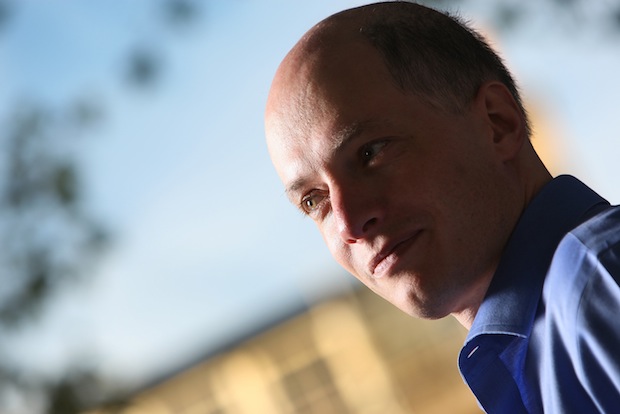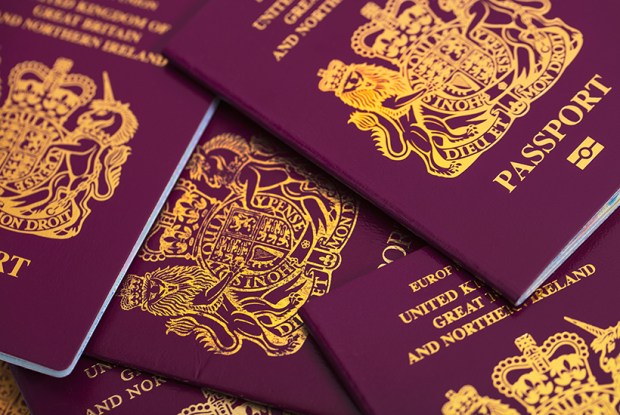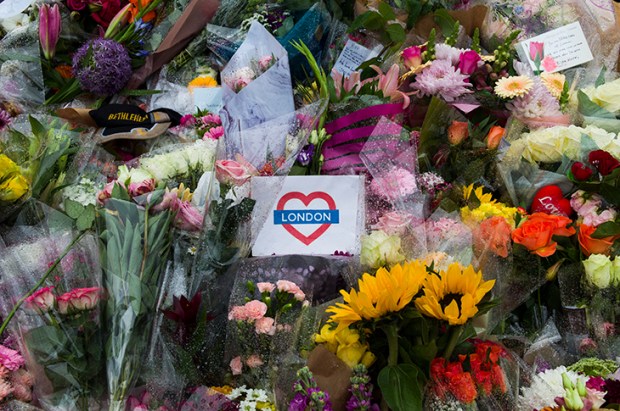Two years ago this week the philosopher Alain de Botton unveiled his proposals for a giant gilded tower in central London at which atheists such as himself could indulge in a spot of self-worship. This edifice was to be 46 metres tall and a line of gold at the top would pick out the years on earth at which creatures almost as brilliant as Alain, i.e. human beings, have been kicking around. He wanted his tower to have majesty and mystery, ‘like you get from looking at Ely Cathedral’, and added: ‘You should feel small, but not in an intimidated way.’
I don’t know if this monumental Tower of Arse has got the go-ahead, or how long it will be after it is built before God smashes it in half and scatters its smug worshippers to the four corners of the earth, as detailed in the Sibylline oracles. Alain’s proposals were criticised by the High Priest of British Atheism, Richard Dawkins, causing a schism in their church from which they have yet to recover. De Botton’s suggestion that one should not feel intimidated by a temple built to himself reminded me a little of Dawkins’s rewriting of the Ten Commandments. Gone was all that tiresome thou-shalt-not stuff, and in its place we had encomiums on living a good life — get out a bit, see lots of people, make sure you put your rubbish in the correct recycling bags etc — the sort of thing you might find on a leaflet in the foyer of your local council, a leaflet for which you have paid good money through the council tax and which is unsurpassable in its irrelevance and presumption. Alain wouldn’t want you to feel intimidated by his fatuous tower, Richard doesn’t want you to be intimidated by his uncommanding commandments. Nothing should intimidate anybody, because we’re all too grand for that, and we shouldn’t have proscriptive rules and regulations.
It would seem to me that the first hymn to be sung at Alain’s temple of atheism would be Eddie and the Hot Rods’ inane but tuneful comeback hit ‘Do Anything You Wanna Do’. Barry Masters and co. asserted, with some force, that they didn’t ‘need no politician tell me what I shouldn’t be/ neither no optician tell me what I oughta see’.
I wonder if either of them, Dawkins or de Botton (not Barry Masters), saw the story in this week’s newspapers about the study carried out by researchers at the University of Manchester. This suggested that there was direct correlation between a higher number of visits to ‘religious places’ and low crime figures. Not only did young people (the study covered those aged between 18 and 34) who attend church show far less propensity to commit crime — especially shoplifting, drug-taking and music piracy — but the more often they went to church, or to the mosque, or wherever, the less likely still they were to commit these crimes.
That’s the good news. The bad news is that, as we know, church attendance has been in decline for 50 years and now fewer than 20 per cent of us go to church at all. The last survey available suggests that almost one third of us now consider ourselves to be, like Richard and Alain, humanists.
The University of Manchester researchers drew some strange conclusions from their study, mind. They said that one reason for a low crime rate associated with church-going might be that the attendees were not mixing with the wrong crowd, which seems to me a rather circular argument. They commit less crime because they are mixing with people who commit less crime — but this doesn’t explain why the other people commit less crime, does it?
The researchers added, for reasons which entirely elude me, that other ‘more secular activities’ may serve a similar role in transmitting the norms of civil society. I can’t think of what those ‘more secular activities’ might be, off hand. Shopping? Going to the pub? Watching television? Being on parole? One thing the researchers didn’t conclude, although it seems to me almost certain to be one cause of the low crime rates, is that the Bible (like the Koran) teaches you not to nick stuff, shag around, get out of your skull on any narcotics, urinate in the doorway of JD Sports while eating a kebab at three o’clock in the morning and rather, of course, to do unto others etc, etc.
Quite why they failed to note this is a genuine mystery to me, although I suppose it might be because they thought it was so obvious it wasn’t worth mentioning. And an attendant reason might be that young believers felt truly, properly intimidated by the thought of some vast and quite annoyed-looking omniscient being watching their every move, and marking things down in His celestial book of wickedness and transgressions. Being cowed by an authority greater than what we have down here on earth seems to work, as a means of stopping people behaving like pigs. Another survey suggested that countries in which there was a widespread, strong and unshakeable belief in the existence of hell also had much lower crime rates than countries where the population tended to believe only in a rather amenable heaven, where everyone goes and has a bloody good time, free drinks, huge buffet and so on.
I wonder how Alain and Richard would explain this, and whether or not they think it’s a good thing?
Got something to add? Join the discussion and comment below.
Get 10 issues for just $10
Subscribe to The Spectator Australia today for the next 10 magazine issues, plus full online access, for just $10.
You might disagree with half of it, but you’ll enjoy reading all of it. Try your first month for free, then just $2 a week for the remainder of your first year.















Comments
Don't miss out
Join the conversation with other Spectator Australia readers. Subscribe to leave a comment.
SUBSCRIBEAlready a subscriber? Log in